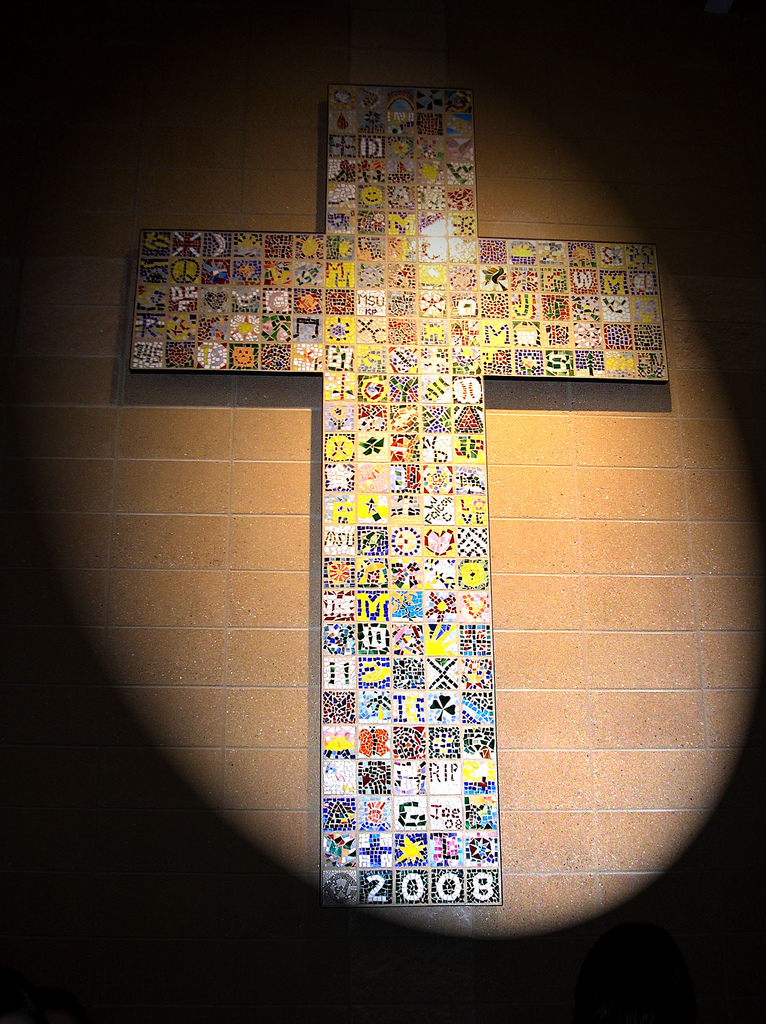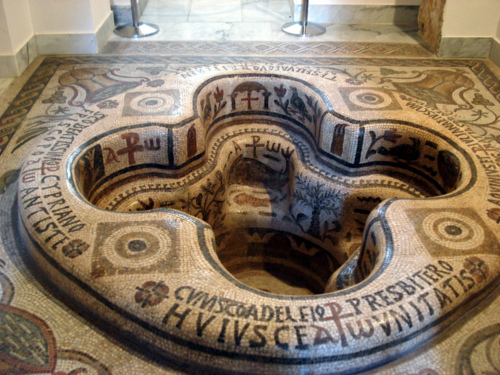For those of us in the US: Happy Independence Day!
As I prepare to celebrate the holiday with family and friends, with hot dogs, hamburgers and all the trimmings, I’m deeply grateful for the freedoms and privileges that being an American citizen has afforded me. I’m mindful, too, of the cost of those freedoms, both in terms of those who have given their own lives or those of their family members in military service and in terms of the people around the world who know poverty as an effect of our collective wealth. I think too of all those who have labored and suffered and lost so much (and benefited so little) for America to become what it is (Native Americans and African-Americans loom large here). Every July 4th I remember a Mass I went to with some Catholic Worker friends about fifteen years ago. The homilist laid on thick the call for us to be grateful for all that God had blessed us with. After Mass, someone in our group said, “We need to be very careful never to confuse our willingness to exploit the poor and our unwillingness to pay attention to who is exploiting them on our behalf with the idea that God has blessed us with abundant material goods.” That idea haunts me each Fourth of July.
This year, however, I have been thinking about how grateful I am to live in a democracy, and also how challenging and important it is to engage the democratic process well: to enquire after truth in dialogue with others, and bringing to bear all the help that faith and reason together offer. Perhaps because John Paul II is in the news again (with his sainthood cause advancing), or perhaps because we are told to expect a papal encyclical tomorrow, I found myself thinking about some of John Paul II’s words about democracy in Centisimus Annus:
The Church values the democratic system inasmuch as it ensures the participation of citizens in making political choices, guarantees to the governed the possibility both of electing and holding accountable those who govern them, and of replacing them through peaceful means when appropriate…. Authentic democracy is possible only in a State ruled by law, and on the basis of a correct conception of the human person. It requires that the necessary conditions be present for the advancement both of the individual through education and formation in true ideals, and of the “subjectivity” of society through the creation of structures of participation and shared responsibility. Nowadays there is a tendency to claim that agnosticism and sceptical relativism are the philosophy and the basic attitude which correspond to democratic forms of political life. Those who are convinced that they know the truth and firmly adhere to it are considered unreliable from a democratic point of view, since they do not accept that truth is determined by the majority, or that it is subject to variation according to different political trends. It must be observed in this regard that if there is no ultimate truth to guide and direct political activity, then ideas and convictions can easily be manipulated for reasons of power. As history demonstrates, a democracy without values easily turns into open or thinly disguised totalitarianism.
[…]
But freedom attains its full development only by accepting the truth. In a world without truth, freedom loses its foundation and man is exposed to the violence of passion and to manipulation, both open and hidden. The Christian upholds freedom and serves it, constantly offering to others the truth which he has known (cf. Jn 8:31-32), in accordance with the missionary nature of his vocation. While paying heed to every fragment of truth which he encounters in the life experience and in the culture of individuals and of nations, he will not fail to affirm in dialogue with others all that his faith and the correct use of reason have enabled him to understand. (Centisimus Annus, #46)
For me, this serves as a reminder of how important it is to celebrate freedom, as Independence Day gives us occasion to do. It is a reminder, too, of how important the connection is between freedom and truth, and especially the truth about the fullness of the dignity of every human person. It is obvious that our nation has failed, historically, to protect and promote the dignity of all and of each. Current failures abound as well (abortion, drones, the repeal of part of the Voting Rights Act, and other contested issues). Celebrating America today doesn’t mean that we celebrate everything, but that we celebrate the opportunity to be part of a (sometimes painful!) process of democracy that invites us to engage, and that gives us the opportunity to move the nation to an ever-growing embodiment of the highest ideals both of Christianity and of America.
As I was finishing up this post, I saw that Jonathan Wilson-Hartgrove, a leader among Evangelicals in the Schools of Conversion and New Monasticism movements, has posted a video on the Fourth of July. It’s worth watching in its entirety (less than 3 minutes). He reflects on his experience being in Iraq in 2003 during the “Shock and Awe” campaign. He says that he was never able to experience Fourth of July fireworks in the same way after that. He calls Christians to celebrate the Fourth of July “by loving the place where we are, and by being honest about all of the ways that we can bless places, and all of the ways that our violence can be a curse. And by repenting of that, so that we can turn to God’s vision of the Beloved Community.”
It’s crucial, I think, that we love our country and our neighbors, that we enter in and bless the place we are. It’s also important that we are critically engaged, and that we call for change through democratic processes where that is needed, and that we call for and offer repentance where that is needed.
But, for today, let’s fire up the grills, strike up the bands, fly the flags. (Perhaps think of Jonathan, and think twice about the fireworks.) Maybe, as we pass the potato salad or pour another glass of mint-strawberry iced tea, we can start a conversation about what freedom is for, what its purposes are, and what its limitations are. Maybe we can celebrate what is wonderful about our country and commit ourselves to the conversations and the work that will make it more just, more free, more a blessing to all.






Political democracy is in the context of history surely a rare gift which we are right to be very grateful for. Recent news from Egypt might remind us what an epic struggle the establishment of a stable democracy can be.
Sadly, John Paul’s wise insights regarding the value of political democracy did not extend to the management of the Church he spent his life serving. Sad because religious authoritarianism is weak and vulnerable for much the the same reasons political authoritarianism is weak and vulnerable.
– Self appointed leaders rarely have sufficient credibility to unite their communities, which sooner or later always leads to internal divisions, conflicts and collapse.
– Authoritarianism inevitably attempts to cling to a comfortable status quo, which stifles the fresh voices, new ideas, and vital energies any community requires to replenish itself. All of God’s creation, every inch of it, is built upon the principle that the old must pass away to make room for the new.
If this blog was limited to only one writer, it would be a weaker blog, no matter what writer was chosen. It’s the diversity of voices that gives this site it’s richness.
The many will always be stronger than the few, no matter who the few are.
This is a truth too, one that John Paul could very clearly see in one realm, but not at all in another. All of us share such inevitable human limitations, which is why it’s never wise to build a big house upon a small foundation.
Very well said Dana !
God Bless
Thank you Dana. As ever, you bring wisdom, leaving me with much to ponder and pray about. That is a gift.
Phil, thanks for commenting. The issues are very complicated, and the Petrine ministry of the Church is not and does not claim to be a democracy. But, of course, depending on what parts of JPII you read, you may find strong convergences between his own leadership and what he called for from democratic leadership. Although there is no room for everyone to have a vote on truth claims in the Church, that is a danger of democracy that John Paul II often warned about (including in the quote above). And, although certain parts of Church leadership and ministry are reserved to those who have been ordained, the call for every more active participation of the laity in many aspects of the life of faith (the liturgy, social justice efforts, personal virtue and prayer) have been consistently called for by JPII and others. “Authoritarianism” seems, to me, an odd word to use of a pope, who of course proposes teaching in ways that he believes to be consistent with the received scriptures and tradition. The kind of coercive power an authoritarian political leader wields and the kind of power a pope wields just seem to me to be radically different.
Hi Dana, thank you for replying to my comments.
First, everyone does have a vote on Catholic truth claims, as we see in the rich diversity of views held by Catholics inhabiting the pews on any given Sunday, and by the varied Catholic perspectives expressed here and elsewhere all across the Net.
Church leaders speak against this diversity, but in their actions they embrace it by welcoming all Catholics to enter Church property, attend mass, and contribute donations.
Point being, in theory there is one Catholic perspective, but in the real world there are many.
The problem I’m clumsily attempting to reference appears when one small group of Catholics appoints themselves to leadership, assumes the trappings of authority, begins speaking for all of us, and proclaims their Catholic perspective to be the only valid Catholic perspective.
Whatever the views of such a small self appointed leadership class might be at any moment in time, whether traditional or progressive etc, such a top down process puts the theory of unity in to conflict with the reality of diversity, thus undermining the credibility of the leadership, leading inevitably to a passionately divided community.
I of course agree that Popes are not dictators, and agree “authoritarian” is not an adequate word to apply to the Catholic clergy.
What I’m struggling to say is that bottom up democratic processes lead to credibility, compromise and relative peace, whereas top down self appointed leadership systems, whether political, religious or other, take us in the opposite direction.
John Paul argued for democracy in Europe, and the result has been peace in Europe. John Paul argued for a top down system within the Church, and the result has been an escalating cycle of conflict within the Catholic community.
Imho, top down systems are built upon fear. We can see this dynamic playing out so clearly now in Egypt, as the Egyptian people struggle to choose between fear and a challenging opportunity.
I don’t think Catholics need to be afraid. We don’t need to cling tightly to any one point of view. We don’t need to have an epic battle over who owns the one and only one true belief. God knows what the truth is, and he probably doesn’t need our help.
We might instead have real faith, and embrace the reality of who we are, an ancient community rich in varied talents and perspectives.